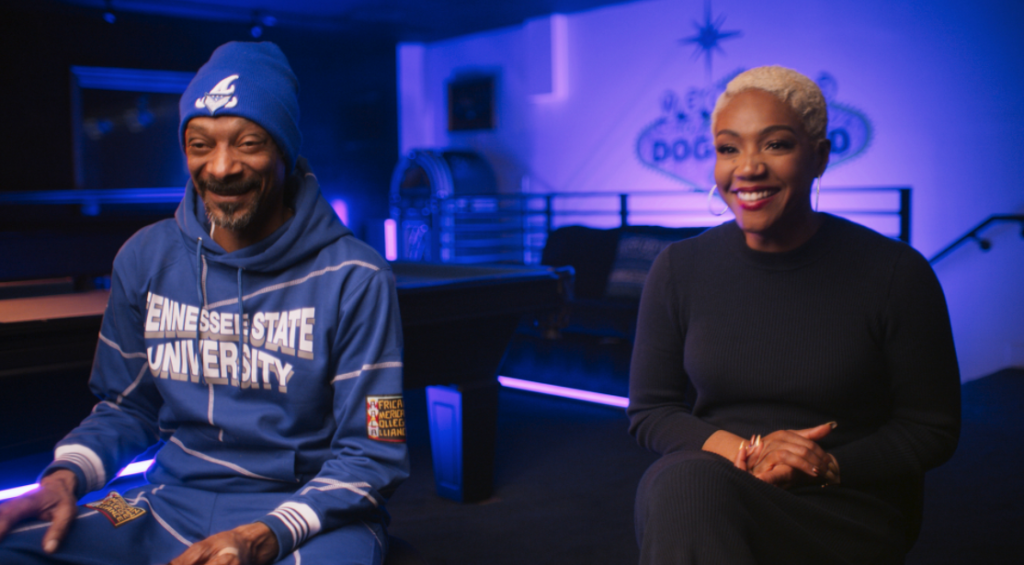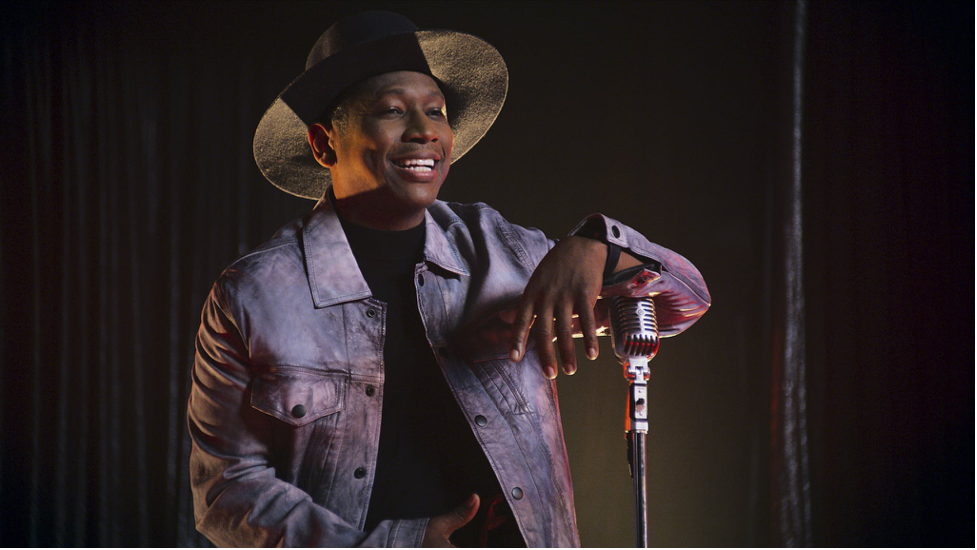‘Phat Tuesdays’ docuseries recalls the Black comedy showcase that changed Hollywood
By PETER LARSEN | [email protected] – Los Angeles Daily News
Comedians J.B. Smoove, Kym Whitley and DeRay Davis, as well as director Reginald Hudlin and executive producer Kelsey Grammer, talk about the influential comedy showcase founded by Guy Torry.

When comedian J.B. Smoove moved to Los Angeles to do standup, he knew exactly where he wanted to play: Phat Tuesdays, a weekly comedy showcase founded by Guy Torry in 1995 at the Comedy Store on the Sunset Strip.
That was a gig you did not want to miss, even if you were, like Smoove, a recent arrival to the city without a car and living on a friend’s couch.
“I was booked for Phat Tuesdays a few times, and this one time I got booked, I had no way to get there,” he says. “So I took my friend’s bike, and I actually rode from LAX all the way to Hollywood, riding in 100 degrees temperature all the way.”
“Man, it was absolutely the place to be,” says Smoove, who’s starred on HBO’s “Curb Your Enthusiasm” since 2007 as Larry David’s friend and tenant Leon Black. “That club, in that period of time, was the place to be, man.”

“Phat Tuesdays: The Era of Hip Hop Comedy” is the new Prime Video docuseries on the decade-long run of the showcase that helped many Black comedians such as Smoove make the jump from comedy rooms to sound stages.
Directed by Reginald Hudlin, who also executive produced with Torry and Kelsey Grammer, the series that debuts Friday, Feb. 4, includes a who’s who of Black entertainers including Smoove, Cedric the Entertainer, Nick Cannon, Steve Harvey, Tiffany Haddish and Snoop Dogg.
“Cheers” and “Frasier” alum Grammer praises Torry for his work.
“He had the vision to recognize a gap in the market to bring two worlds together and say, ‘You guys can make it work out,’” Grammer says. “That’s what ended up being the result. It was great, funny stuff.”
A great place to be
During its decade-long run, Phat Tuesday was a club like no other, Smoove says.
“Certain clubs, the people show up, and you get a chance to be in your element, to enjoy,” Smoove says. “Not just the audience, but other comedians, too.
“Comedians, as competitive as some of us are, we love to see each other, we love to jump each other up,” he says. “It was great, man.”
The club finished in 2005, but years later Torry was on a flight with comedian Michael Blackson, who told him how much he missed Phat Tuesdays and that it was a shame that younger comics never knew it.
“He planted that seed, and I just started thinking, ‘How much stuff do I have?’ I’m a hoarder, like my mom,” Torry says. “Then it’s going to the storage unit, raise up the door and dig through all the crates and all the boxes and see what I had.”
He had a lot. “Phat Tuesdays” makes that clear with its wealth of archival footage. As Torry talked to comedians, actors, writers and directors about this seed of an idea, he realized how important the showcase had been to them, too.
“They start pouring out what Phat Tuesdays did for them,” Torry says. “How important it was to them, and how it made them feel better during that time after the Rodney King riots and verdict.”
How it all got started
Back then, in the early ’90s, Torry had followed his show-biz dreams and his older brother, the comedian-actor Joe Torry, from St. Louis to Los Angeles. At the time, the Comedy Act Theatre in South Los Angeles was the preeminent Black comedy club in the city.
But the death of that club’s popular MC, comedian Robin Harris, who starred in Hudlin’s 1990 debut “House Party,” and the 1992 riots that followed the acquittal of police officers in the beating of Rodney King had an effect on the club’s popularity with Hollywood producers and casting agents.
So in 1995, Torry approached Comedy Store owner Mitzi Shore with a proposal to “bring the ‘hood to Hollywood,” as one interviewee puts it in “Phat Tuesdays.” It was a success from the start.
Hudlin, whose resume as a director includes the Eddie Murphy movie “Boomerang,” the documentary “The Black Godfather,” and an Academy Award nomination as producer of Quentin Tarantino’s “Django Unchained,” remembers Phat Tuesdays as a cultural event in the Black entertainment community.
“Comedy was the centerpiece,” he says. “But it attracted the biggest athletes, it attracted the hottest musicians and stunningly beautiful women. So there were many reasons to go to Phat Tuesdays.”
Producer Grammer, who comes from TV comedy, not standup, says it was almost a no-brainer Hollywood would scout Phat Tuesdays for new talents once Torry made it as easy as a stop on the Sunset Strip.
“My hat’s off to Guy because he brought people in the room where (comedians) could say, ‘You need me. You need this. You guys haven’t thought of me yet,’” Grammer says.
“That solved a lot of problems for people, it made a lot of people money, and it did give several people some really great careers,” he says.
When Torry approached him, Hudlin says he quickly signed on to document the impact that Phat Tuesdays had.
“It’s very easy to discount recent history, history you lived through,” he says. “But fortunately I have two teenagers who just go, ‘I don’t know anything you’re talking about, dad. I don’t know why you think your friends are so special.’
“So this was an opportunity to really explain that,” Hudlin says. “Like, we did some stuff, and you know, we changed the world.”
The comic’s perspective
Actor-comedian DeRay Davis was new in L.A. when he showed up one night to check out the club about which comedians across the country had started to talk.
“My first time in the room, Guy Torry roasted me,” Davis says. “He didn’t know I was a comedian and he talked about my sweater real bad, and I knew that night was not gonna be my night to go on.”
But at the end of the night, the energy he felt told him that this was definitely the place he wanted to play.
“This is the love I want to feel,” Davis says. “Whether it be him roasting my sweater, which I thought I spent a lot of money on, or me being on stage talking about someone else’s sweater they thought they spent a lot of money on.”
Actor-comedian Kym Whitley says that for Black comedians, playing in front of a largely Black audience gave Phat Tuesdays a special feel for the comics on its stage.
“It was a Black room, at least at first,” she says. “Once it got popular I think it was a mixed audience. But I found I was more comfortable going into a Black room. It made it a place like home, that was easier, warmer.
“I was like, ‘OK, I see my peers, you know, so I made it,” Whitley says. “It was like going to the Black church.”
Davis, Whitley, and Smoove all say that Phat Tuesdays gave them and other Black comedians not only a place to make each other and a mostly Black audience laugh, but also the kind of exposure that could change careers.
“These are little seeds you’re planting,” Smoove says of those moments on stage when a casting director, producer, writer or director might be in the audience. “You have no idea you’re doing it, but it’s gonna come out of the ground at some point.
“That’s what I feel like the club did; it set you up,” he says. “And all you got to do is go on stage and hit the ball.”
Davis says Phat Tuesdays gave comics a chance to level the odds a bit with actors, who typically have much more experience with cold readings and traditional auditions.
“Their strength is that; our strength was the stage,” he says. “We were let loose at Phat Tuesdays. You got to show a character they weren’t considering.”
Whitley and Davis also both saw Phat Tuesdays as an informal kind of support network for Black comics and actors trying to break into film and television.
“It was like hanging out with your family,” Whitley says of the late-night dinners out after a showcase ended.
“It ain’t like texting each other now,” Davis says. “Our texts were sitting next to each other. We were the group chat in person.”
